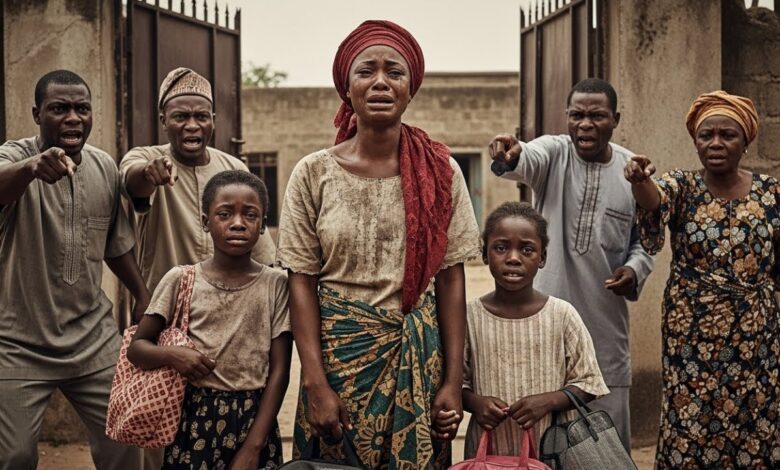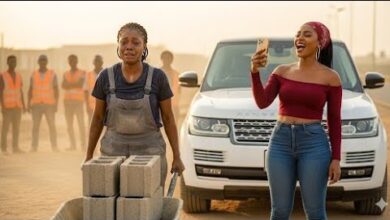Movie
The Uncles Threw The Widow and Her Two Daughters Out of Their House. 25 Years Later, THIS HAPPENED
The Uncles Threw The Widow and Her Two Daughters Out of Their House. 25 Years Later, THIS HAPPENED

EPISODE: 2
-
But she had her daughters and she had fire. They didn’t know it yet, but the world would one day bow to them. The days bled into each other like bruises that never healed. In the mornings, a doggo would rise from the cold mud floor of the abandoned shed, her bones aching, her throat dry, and her fingers numb.
-
Each morning she woke before the girls did, partly to check if they were still breathing, and partly because the guilt wouldn’t let her sleep longer. The roof of the shed had holes that dripped steadily when it rained and moaned in the heat. Dust layered everything. Lizards made their homes in the cracks of the walls. The shed wasn’t a shelter.
-
It was a slow death wrapped in silence. Sometimes when the sun rose, she would sit outside, her wrapper stiff with yesterday’s dampness, watching the village come alive from a distance, a village that once called her nua odogu, wife of the great one. Now people passed her by like she was fog on glass.
-
Okuchi coughed through the nights, a deep dry cough that scraped the inside of her small chest. Chiiamaka’s legs had grown so thin that Adogo worried they would snap if she jumped wrong. The girls rarely spoke. Hunger had started to eat their spirits before it finished with their bodies. Adoggo tried begging at first, but nothing came out of it.
-
She went to old friends, women she had once helped during child labor or given food to during hard times. None of them could meet her eyes. They looked through her. One woman even dropped her calabash and hissed. This one thinks we will suffer because she refused to obey tradition. That night, a doggo wanted to cry, but she couldn’t.
-
She couldn’t afford the energy. It rained again on the sixth day. The roof of the shed let in more water than it kept out. The floor turned to mud. Their rappers got soaked. A doggo had used her body to shield the girls, holding them tightly to her chest while their little bodies shivered. She whispered prayers, not because she believed they would be answered, but because her voice was the only thing louder than the storm.
-
Okuchi clung to her like a frightened child, though she hadn’t acted like one in days. That night, Adago felt something inside her shift. Something break. It wasn’t defeat. It was the breaking point of what the world had tried to bend. Her lips were cold, but her mind was burning. By morning, she was soaked to the bone. Her daughters were weak.
-
Kiaka’s lips had cracked. Okuchi had stopped coughing for hours, not because she got better, but because her throat was too dry. There was no food, not even the small tuber of yam she had traded her only jewelry for. She stepped outside, lifted her eyes to the sky, and spoke one word. Enough. Her daughters were wasting.
-
Okuchi had started to talk in her sleep. Kiiamaka, once so playful, now stared blankly at walls. Later at night, a doggo sat them both down and looked them in the eyes. “My daughters,” she said, her voice steady but low. “This village has nothing for us anymore. Not even pity. If we stay, we will die here. We are going to leave. We will go to a city where nobody knows our names.
-
A place where tradition won’t bury us alive. Kiaka’s voice cracked. Will they give us food there? Adgo wiped her face and nodded slowly. We will find it even if it means I carry head pans or sweep gutters. At least they won’t tell us we don’t belong. That night, she held them close and let herself cry quietly so the girls wouldn’t hear.
-
It was the first time in days. The journey began before sunrise. Adobo tied one wrapper around her waist and another around her chest. She packed what little they had into a thin polyine bag, one cup of dry rice, and a half used soap. Okuchi carried the bag. Chiamaka held her hand. The road out of the village was long and silent. No one noticed them leave.
-
The morning mist clung to their skin as they passed the mango trees in the empty farmlands. A doggo walked with purpose, her legs weak, but steady. Every step was pain, but pain was better than death. They reached the main road by midday. Dust coated their feet. Chiaka asked if they could rest, but Adogo told her no.
-
If we rest now, we’ll never move again. A bus finally came. It was old and rusty, held together by wire and hope. The conductor shouted the name of the city they were headed, Onicha. A doggo counted her last 200 naira and held it up. “Three of us, please help us,” she said. The conductor looked them over and sneered. No load.
-
She shook her head. He took the money. The girl squeezed into the back seat. A doggo sat near the window. As the bus rattled away from the village, she didn’t look back. There was nothing left to see. Their first few days in Anicha were hard. The bus had dropped them at Upperweeka, and the noise alone felt like something they had never known.
EPISODE: 3
-
Traders screamed prices from both sides of the road. Kiki riders nearly brushed past their legs, and the air was thick with smoke and sweat. A doggo didn’t know where to start. She held her daughters tightly and asked a bread seller if there was any place people slept at night for free. The woman pointed vaguely and walked away. They just walked around for hours.
-
When it got dark, she spotted a dusty alley near a large unfinished building. She saw others sleeping there, mostly women and children. Some had cartons, some just sat and waited for morning. She spoke to one woman who nodded and allowed her space near a wall. That night, a doggo spread what was left of her wrapper. Her daughters laid on it.
-
She stayed awake, eyes open, watching everything around her. She saw a man steal from another sleeping child. She heard footsteps that never stopped. She heard coughs and small cries. When the girls finally slept, she sat on the floor beside them, her legs stretched, her stomach empty. Morning came slowly. They had no plan.
-
They only had the fact that no one knew them here. That day, a doggo joined a group of women walking toward the main road. They told her they were going to beg. One woman gave her a piece of carton to write something. She borrowed a pen and wrote, “Please help me feed my children.” She made Okuchi and Chiaka stand beside her as she held the sign. Some people dropped money.
-
Some people ignored them and some insulted them. One man gave her 100 naira and told her to stop blocking the walkway. They didn’t make much, but it was something. Every evening, they walked back to the uncompleted building, held hands, and tried to sleep through the night noise. By the fourth day, Adalago had saved 1,400 naira.
-
She used 800 naira to buy firewood and small pieces of plantain. She used 200 naira for pepper and onions. The rest she saved again. She told her daughters, “Tomorrow we will try to cook and sell. If we don’t make anything, we go back to begging.” That morning, she borrowed a small iron stand from one of the women who roasted yam.
-
She begged for a corner near a busy bus stop in Okanja. She cleaned the spot, arranged the firewood, and lit the fire. The plantains were small and brown, but she turned them with care. The pepper sauce boiled slowly in a small pot she borrowed. She stirred it with a stick. People passed. The first woman who bought asked how much. Adago said 300 naira with sauce.
-
The woman bought two. She smiled. That day she made 3,600 naira. It was more money than she had touched since her husband’s death. That night they ate boiled rice with fried plantain. She gave the girls warm water to bathe. They used a black rubber bucket near the edge of the building.
-
The next day they went again. This time people were already waiting. Her daughters helped her wash the trays and hand her fresh plantains. Okuchi counted the money. Kiaka cleaned the bench with a rag they brought from the building. They no longer stood on the roadside holding signs. They no longer asked anyone for anything. They just worked.
-
A doggo didn’t allow herself to feel joy. She only allowed herself to breathe. When one of the conductors gave her 500 naira instead of 300 naira and told her to keep the change, she felt a wave of joy. Her girls were eating. That was enough. They still slept in the uncompleted building. But now they had one extra wrapper.
-
They had a lantern that a woman gave them. They bought sanitary pads. They bought soap. And a doggo started saving 1,500 NRA every day. Business picked up fast. The smell of a doggo’s pepper sauce began to attract more people. The spot that once made 3,600 naira in a day began to make more than 12,000 naira on weekends.
-
People called it Mama Twin Sauce. Bus drivers would stop just to buy. Kiki riders asked if they could book ahead. Sometimes a doggo had to send a back to the market to buy more plantain. Chiamaka now served customers while her mother focused on the fire. They were getting noticed. Some women from nearby stalls watched them quietly. Others tried to copy the recipe, but theirs never tasted the same.
-
Each morning, Adgo thanked God quietly before lighting the firewood. Her daughters were eating three times a day. Their faces were no longer pale. They were growing. Their bodies were filling out. They laughed now. A doggo was able to buy small stools. She bought a second tray. She bought pepper in bulk. She started cooking earlier just to meet demand.
-
One man stood out from the rest of her customers. His name was Mr. Kenneth Noakoy. His car was clean and flashy, a black Lexus SUV. He had a driver, but he always came down to buy the food himself. He had bought from a doggo twice in the last 2 weeks, each time asking for extra sauce. He always paid with clean notes. That afternoon, business was slow. The road was quiet.
-
People weren’t stopping. Adago had barely sold anything. She had just finished roasting a new batch of plantains when Mr. Kenneth returned this time. He didn’t go back to his car. He pulled a plastic stool, sat under the umbrella, and ate there. Okuchi cleaned a nearby tray. Kiaka arranged the pepper containers.
-
After eating half the plate, he looked up and asked a doggo, “Madam, I’ve eaten from you twice. Your food is good, but there’s a story behind your eyes. Why are you really here? Why are your children not in school? The question stirred a doggo’s emotions. She hesitated at first, but after a few seconds, she began to talk. She told him everything.




